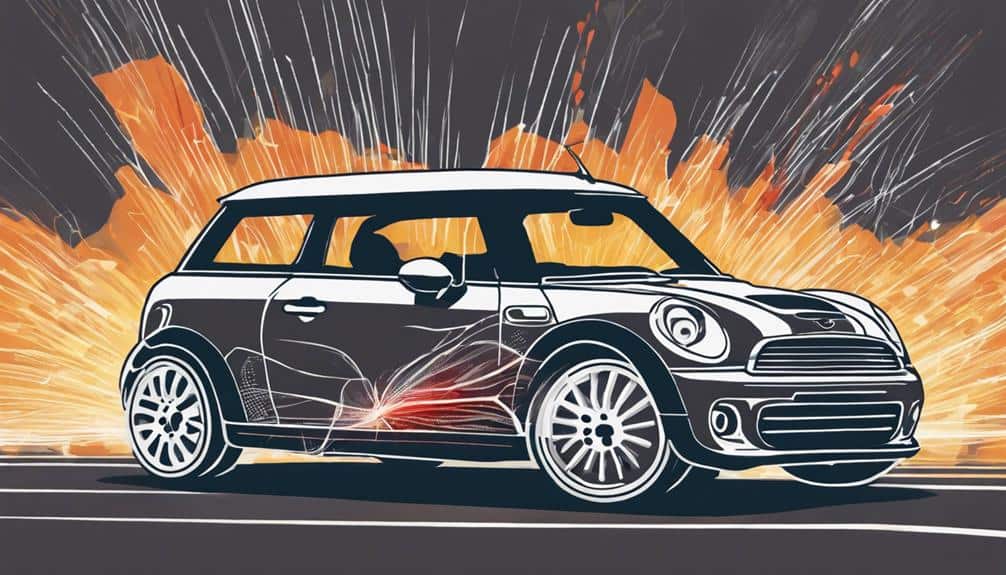Your Mini Cooper is likely juddering due to several potential issues. Worn spark plugs, dirty fuel injectors, and transmission fluid problems are common culprits. If you're experiencing juddering during acceleration, this could indicate spark plug or fuel system problems. When pulling away, clutch wear or engine misfires may be to blame. At low revs, carbon buildup or ignition issues could cause juddering, while idle speed issues often result from dirty throttle bodies or vacuum leaks. Regular maintenance is key to preventing these problems. Learning more about each issue's specific symptoms and solutions can help pinpoint the root cause.
Common Causes of Juddering
Several factors, including worn-out spark plugs and dirty fuel injectors, can cause your Mini Cooper to judder. When spark plugs become old or faulty, they fail to ignite the fuel-air mixture efficiently, leading to uneven engine performance and juddering. Similarly, fuel injectors that are clogged or malfunctioning disrupt the flow of fuel into the engine, causing irregular combustion and, consequently, juddering. It's important to regularly check and replace spark plugs and make sure fuel injectors are clean and functioning correctly to prevent these issues.
Moreover, the condition of your Mini Cooper's transmission fluid plays a significant role in preventing juddering. Contaminated or low levels of transmission fluid can result in inadequate lubrication and cooling of the transmission components. This deficiency can cause the transmission to perform erratically, leading to juddering sensations while driving. Regularly inspecting and maintaining the proper level and quality of transmission fluid is essential to the smooth operation of your vehicle's transmission system and to avoid juddering.
Juddering During Acceleration
When you're experiencing juddering during acceleration in your Mini Cooper, it's important to check spark plug issues and fuel system problems.
Faulty spark plugs can disrupt engine performance, leading to noticeable juddering. Similarly, issues within the fuel system may restrict proper fuel flow, exacerbating acceleration problems.
Spark Plug Issues
Experiencing juddering during acceleration in your Mini Cooper often points to worn-out or faulty spark plugs. This problem is particularly noticeable around 40-50mph, where you might feel a jerky motion disrupting the smoothness of your ride.
Spark plugs play an important role in the engine's combustion process, and when they fail, they can lead to performance issues like juddering. Fortunately, replacing the spark plugs can resolve this issue. The cost for this fix is typically around $400, but it's a worthy investment to restore your Mini Cooper's performance.
To prevent future juddering during acceleration, proper maintenance of spark plugs is essential. Regular checks and timely replacements will keep your Mini Cooper running smoothly and efficiently.
Fuel System Problems
Addressing fuel system issues, such as dirty or malfunctioning fuel injectors, can greatly reduce juddering during acceleration in your Mini Cooper. Clogged or worn-out fuel filters restrict the flow of fuel to the engine, exacerbating acceleration problems.
Similarly, fuel injectors that are contaminated or not functioning correctly can disrupt the precise mixture of fuel and air, leading to uneven engine performance and juddering.
Additionally, contaminated or low transmission fluid levels can indirectly affect your vehicle's acceleration smoothness by impacting the transmission's ability to shift gears efficiently.
Ensuring that your Mini Cooper's fuel filter and fuel injectors are clean and in good working order, along with maintaining proper transmission fluid levels, is essential for minimizing juddering during acceleration.
Issues When Pulling Away
When you notice your Mini Cooper juddering as you pull away, it's important to take into account clutch wear symptoms and engine misfire causes.
Worn clutch components or misfiring due to spark plug issues can directly impact your car's performance during initial acceleration.
Addressing these areas promptly can mitigate the juddering effect and restore smooth operation.
Clutch Wear Symptoms
Clutch wear in your Mini Cooper often manifests as juddering or shuddering when you attempt to pull away, signaling the need for a prompt inspection. This issue, indicative of clutch wear, can lead to juddering on acceleration and potentially exacerbate transmission issues if not addressed. Here are key symptoms to watch for:
- Shuddering or vibration during acceleration, especially noticeable when pulling away.
- Difficulty engaging gears, which might feel more challenging than usual, indicating potential clutch slipping.
- A distinct burning smell or a grinding noise when changing gears, both signs that the clutch components are wearing out.
- Slipping of the clutch, where the engine revs increase without a corresponding increase in vehicle speed, suggesting the clutch isn't transferring power effectively.
Addressing these symptoms promptly can prevent further damage to your Mini Cooper's transmission system.
Engine Misfire Causes
Engine misfires in your Mini Cooper, often resulting from faulty spark plugs or ignition coils, can lead to juddering when you're pulling away. These critical components are responsible for igniting the fuel-air mixture in the engine. If they're not functioning correctly, you'll likely experience uneven engine performance and vibrations.
Additionally, a clogged fuel injector can disrupt the flow of fuel to the engine, further contributing to misfires. Such issues, alongside a dirty fuel filter, impair the engine's ability to maintain a proper air-fuel mixture, triggering a lean condition that exacerbates the problem. Vacuum leaks or faulty engine sensors also play a role in creating an imbalance, leading to juddering.
Regular maintenance, focusing on spark plugs and the fuel system, is vital in preventing these issues.
Low Revs Judder Explained
Experiencing juddering at low revs often stems from carbon buildup within your Mini Cooper's engine. This issue isn't just annoying; it can signal underlying problems that need attention. When your car shudders, especially in lower gears like 3rd, 4th, or 5th, it's important to understand the mechanics at play to address the issue effectively.
Here are key factors contributing to low revs judder:
- Carbon Buildup: Accumulation in the engine restricts airflow and fuel mixture, hindering smooth operation.
- Ignition Issues: Faulty spark plugs or ignition coils disrupt the engine's ability to fire correctly, leading to uneven power distribution.
- Low Cylinder Compression: A cylinder failing to maintain adequate compression can cause the engine to judder and almost stall.
- Damaged Coil Components: Ignition coils and spark plugs that are incorrectly installed or physically damaged can cause misfiring and juddering.
While upshifting earlier might temporarily alleviate the problem, it's a band-aid solution. For persistent or severe juddering, seeking a professional diagnosis is paramount. Ignoring these signs can exacerbate the issue, turning a fixable problem into a costly repair.
Idle Speed Juddering
After addressing juddering at low revs, it's important to tackle the issue of idle speed juddering in your Mini Cooper. This annoying problem can stem from several sources, including dirty throttle bodies, vacuum leaks, or a faulty idle control valve. Each of these issues disrupts the delicate balance of air and fuel entering your engine, leading to uneven idle and the juddering you're experiencing.
Firstly, dirty throttle bodies are a common culprit. Over time, carbon buildup can greatly hinder their operation, leading to erratic idle speeds. Regular cleaning is essential to maintain smooth operation and prevent juddering.
Secondly, vacuum leaks introduce unmetered air into your engine, upsetting the air-fuel mixture. This imbalance can cause your Mini Cooper to judder at idle, as the engine struggles to maintain a consistent speed.
Lastly, a faulty idle control valve can lead to low idle speeds, another potential cause of juddering. This valve plays a vital role in managing your engine's idle speed, and if it's not functioning correctly, juddering can occur.
Addressing these issues through regular maintenance and timely repairs is important to prevent idle speed juddering. Don't overlook the importance of keeping your throttle bodies clean, checking for vacuum leaks, and ensuring the idle control valve is in good working order.
High-Speed Driving Issues
While addressing idle speed issues is important, juddering at high speeds in your Mini Cooper often indicates problems with spark plugs, fuel injectors, or the transmission fluid. This juddering sensation can't only reduce your driving comfort but also signal underlying issues that could lead to more serious damages if not addressed promptly.
Consider the following factors that could be contributing to your high-speed juddering concerns:
- Worn Spark Plugs: These are essential for the ignition system. Over time, they can deteriorate, leading to inefficient combustion and juddering.
- Clogged Fuel Injectors: Dirty fuel injectors disrupt the smooth flow of fuel to the engine, causing uneven engine performance and noticeable juddering.
- Faulty Transmission Fluid: The transmission fluid facilitates smooth gear shifts. When it's old or contaminated, it can cause the transmission to judder.
- Clogged Catalytic Converter: A blocked catalytic converter restricts exhaust flow, affecting engine performance and contributing to juddering at high speeds.
Regular maintenance, including timely replacement of spark plugs, cleaning of fuel injectors, and changing of transmission fluid, is essential. Addressing these issues promptly can help ensure your Mini Cooper runs smoothly, even at high speeds, preventing the uncomfortable and potentially harmful effects of juddering.
Braking Judder Solutions
Addressing braking judder in your Mini Cooper often starts with inspecting the brake rotors for warping. Warped brake rotors are a primary culprit behind this unnerving sensation. It's crucial to check for any uneven wear or thickness variation in both the brake pads and rotors. These discrepancies can greatly contribute to braking judder, compromising your vehicle's stopping performance.
To tackle this issue effectively, you might need to either resurface or replace the brake rotors. Resurfacing can smooth out minor imperfections and restore the rotor's flat surface, provided the rotor hasn't worn down past its minimum thickness limit. However, in cases of severe warping or when rotors are too thin, replacement is the only necessary solution.
Another critical step is properly torquing the wheel bolts. Incorrect torque on these bolts can lead to uneven pressure distribution on the rotors, causing them to warp over time. Ensuring that wheel bolts are tightened to the manufacturer's specified torque is essential in preventing future braking judder.
Lastly, regular maintenance of your Mini Cooper's brake system is key. By keeping an eye on brake pad wear and rotor condition, you can prevent the onset of braking judder, ensuring smoother, safer stops.
Conclusion
So, you've explored a rollercoaster ride through the world of Mini Cooper judders, from the thrilling accelerations that weren't meant to be thrilling, to the mysterious judders at idle that made you question whether your car was trying to communicate in Morse code.
Whether it's a high-speed drama or a low-rev horror story, the solution often lies in the technical nitty-gritty. Remember, your Mini's smooth ride shouldn't feel like you're blending a smoothie.
Engage in those diagnostics; your vehicle's smooth performance is just a fix away.

